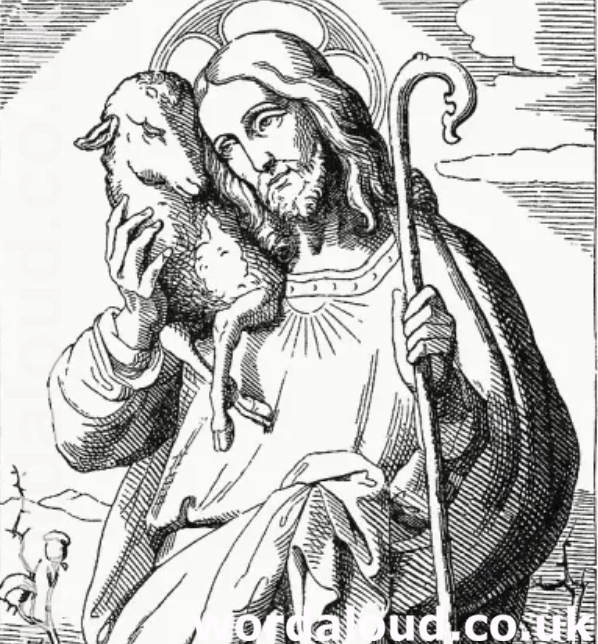Christian Art | Jesus Christ Is The True Shepherd
Office Of Readings | Week 25, Monday, Ordinary Time | From The Sermon Of Saint Augustine On The Shepherds | Be Urgent In Season, Out Of Season
‘Welcome or unwelcome, insist upon the message.’
Saint Augustine confronts the pastor’s duty to seek those who stray and to call back the lost, even when that task is resisted or resented. He frames the obligation in stark terms: sheep wander; wolves and robbers threaten; the shepherd must go after the weak and the scattered. The passage presses a practical point about pastoral courage. The preacher must ‘preach the word; insist upon it’ (cf. 2 Timothy 4:2) whether the hearers welcome or reject it.
Two lines of thought run through the text. First, Augustine rejects any pastoral posture that prefers comfort or popularity to the care of souls. If a flock is neglected because its members are insolent or ungrateful, the danger is not to the pastor’s reputation but to the sheep themselves and, by extension, to the whole community. Second, he underlines the connective risk: neglecting the straying and the lost endangers even the strong. The moral contagion of wandering behaviour can spread; a shepherd who fails to act risks greater damage than the immediate cost of effort.
Augustine couches his insistence in the language of accountability. The pastor does his work before Christ’s judgment-seat; obedience to that summons takes precedence over human disapproval. The image of forcing through brambles and hedges conveys the persistence required: searching must be strenuous and thorough. This reading completes the Ezekiel motif that runs through the sermon On Pastors: pastoral office is service that seeks the welfare of the flock, not self-enrichment or ease.

From The Sermon Of Saint Augustine On The Shepherds | Be Urgent In Season, Out Of Season
The straying sheep you have not recalled; the lost sheep you have not sought. In one way or another, we go on living between the hands of robbers and the teeth of raging wolves, and in light of these present dangers we ask your prayers. The sheep moreover are insolent. The shepherd seeks out the straying sheep, but because they have wandered away and are lost they say that they are not ours. ‘ Why do you want us? Why do you seek us?’ they ask, as if their straying and being lost were not the very reason for our wanting them and seeking them out. ‘If I am straying,’ he says, ‘if I am lost, why do you want me?’ You are straying, that is why I wish to recall you. You have been lost, I wish to find you. ‘But I wish to stray,’ he says: ‘I wish to be lost.’
So you wish to stray and be lost? How much better that I do not also wish this. Certainly, I dare say, I am unwelcome. But I listen to the Apostle who says: Preach the word; insist upon it, welcome and unwelcome. Welcome to whom? Unwelcome to whom? By all means welcome to those who desire it; unwelcome to those who do not. However unwelcome, I dare to say: ‘You wish to stray, you wish to be lost; but I do not want this.’ For the one whom I fear does not wish this. And should I wish it, consider his words of reproach: The straying sheep you have not recalled; the lost sheep you have not sought. Shall I fear you rather than him? Remember, we must all present ourselves before the judgement seat of Christ.
I shall recall the straying; I shall seek the lost. Whether they wish it or not, I shall do it. And should the brambles of the forests tear at me when I seek them, I shall force myself through all straits; I shall put down all hedges. So far as the God whom I fear grants me the strength, I shall search everywhere. I shall recall the straying; I shall seek after those on the verge of being lost. If you do not want me to suffer, do not stray, do not become lost. It is enough that I lament your straying and loss. No, I fear that in neglecting you, I shall also kill what is strong. Consider the passage that follows: And what was strong you have destroyed. Should I neglect the straying and lost, the strong one will also take delight in straying and in being lost.
Christian Prayer With Jesus Christ
Lord Jesus, Good Shepherd,
grant to those who tend your flock the courage to seek the lost,
and the patience to call back the straying.
Keep us from indifference and from putting comfort before care.
May your ministers persist in the work of mercy,
and may every wandering heart find its way home.
You live and reign with the Father and the Holy Spirit, one God, forever. Amen.
Glossary Of Christian Terms
Shepherd / Sheep – Traditional pastoral imagery: shepherds are leaders (bishops, priests), sheep the faithful entrusted to them.
Straying / Lost – Those who abandon regular life in the Church or are separated by sin or indifference.
‘Preach the word; insist upon it’ – A summons taken from Paul (2 Timothy 4:2) that Augustine applies to persistent proclamation, whether it is welcomed or not.
Brambles and hedges – Metaphors for obstacles the pastor must penetrate in the effort to reach those who are distant from the Church.
Judgement-seat of Christ – A reminder of the pastor’s final accountability to Christ for the care of the flock (cf. 2 Corinthians 5:10).
Ezekiel 34 – Scriptural source for Augustine’s critique of negligent shepherds and his model of pastoral responsibility.








